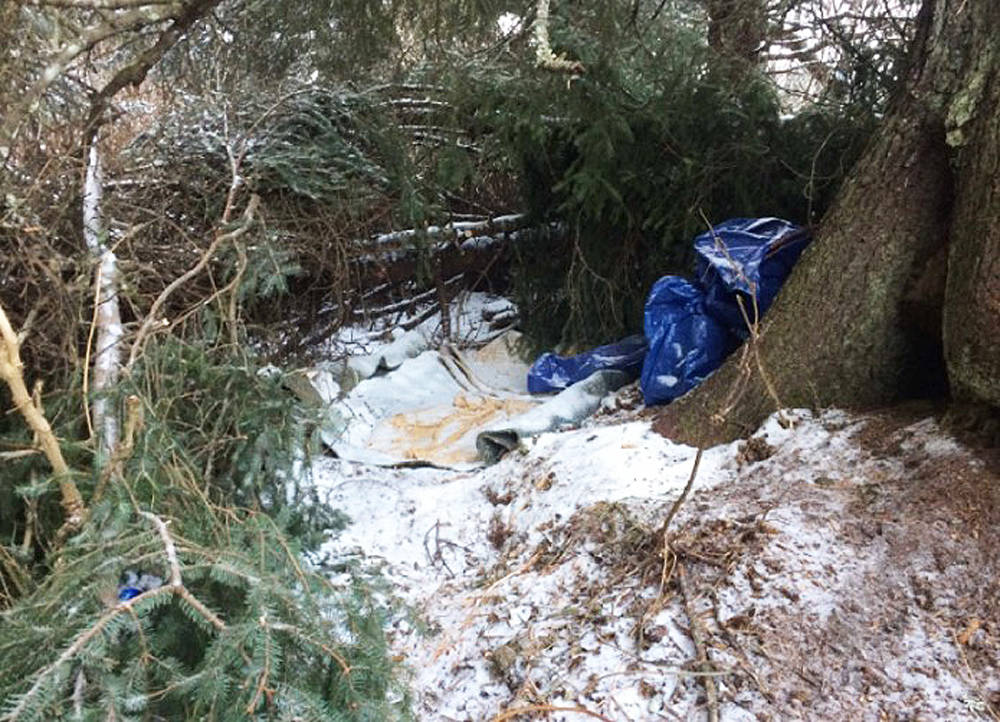A man who faked his own death in 2016 to avoid a court appearance and triggered an expensive and needless search and rescue operation has been sentenced to two and a half years in prison at the federal level.
The U.S. Attorney Office, District of Alaska office sent out a release Thursday detailing the sentence and the case. Ryan Riley Meganack, 35, pleaded guilty in federal court to false distress and being in possession of a firearm as a convicted felon. Fifteen months of the new federal sentence will be served consecutively to a 15-year sentence he got in state court for sexual assault committed in 2015.
It all started on Nov. 29, 2016, when authorities say Meganack took his fishing vessel, the F/V Aires, to Passage Island near Port Graham Bay, south of Homer, alone. Meganack had been a commercial fisherman for about two decades, according to the sentencing memorandum for the case. It was there that he faked his own death. According to the release, he purposely swamped a smaller skiff he had been towing behind his larger fishing vessel, “and made it appear that he had gone missing after a boating accident or had otherwise died.”
Investigation later revealed that Meganack had been charged in January 2015 for sexual assault of an incapacitated woman in Anchorage. Online court records show he faced one count of first-degree sexual assault, four counts of second-degree sexual assault and three counts of third-degree sexual assault, and that he was scheduled to plead guilty to one count of third-degree sexual assault on Dec. 5, 2016, in Anchorage court.
“Meganack was a second-time sex offender and faced many years in prison for that crime,” the release states. “To avoid prison, Meganack hatched a plan to fake his own death, which involved him causing a false report of distress to the U.S. Coast Guard.”
Meganack then enlisted the help of his then-girlfriend, Ivy Rodriguez, now 28. He picked her up in the larger fishing vessel, which they anchored in a tidal lagoon before walking back to Port Graham, where Meganack proceeded to hide. He went to a makeshift camp he had set up ahead of time and stocked with supplies he would need, according to the sentencing memo. The camp was in the woods roughly 400 feet from his mother’s house in Port Graham.
Rodriguez reported to Meganack’s mother in the early hours of Nov. 30, 2018 a number of falsified facts to make the case that Meganack had disappeared. According to the U.S. Attorney’s report of the case, Rodriguez told his mother that she and Meganack had gotten into a fight, and that he had left, drunk, in the skiff. She also told his mother that the skiff was “not working well.”
This triggered an involved search and rescue effort that involved local Port Graham residents, the Alaska State Troopers, the U.S. Coast Guard Air Station Kodiak and other Coast Guard resources, and Alaska State Parks rangers. When Meganack was indicted with the federal charges back in July 2017, it was reported the search cost $310,897.50 from the Coast Guard alone. That price tag was updated in the new press release, which reported the Coast Guard expenditures to be closer to $384,261.
“When searchers found Meganack’s skiff, the motor was down, its throttle was forward, the key was in the ‘on’ position, and inside was a single rubber boot and an empty bottle of liquor,” according to the release.
Troopers got a tip on Dec. 1, 2016, that Meganack might be hiding in Port Graham instead of missing. It was then they discovered his scheduled change of plea hearing in Anchorage.
It turns out Rodriguez, “wracked by guilt after seeing how distraught Defendant’s family was,” had told Meganack’s mother that he was really alive and in hiding, according to the sentencing memorandum. His mother reported that to a local tribal leader, who passed the tip on to troopers.
Rodriguez cooperated and told authorities where he was hiding in the makeshift shelter.
Meganack was first arrested on Dec. 2, 2016 and was charged locally with one count of disorderly conduct. Once back in custody, Meganack appeared in state court to plead guilty to the single count of third-degree sexual assault in his Anchorage case and was given the 15-year sentence in June 2017, according to online court records. All other charges in that case were dismissed.
When authorities found Meganack, they also found a semiautomatic rifle, and he was subsequently charged federally with one count of false distress and one count of felon in possession of a firearm.
U.S. District Judge Sharon Gleason, who presided over the federal case, said Meganack’s actions had “an enormous impact” on both the Port Graham community and on the Coast Guard, according to the release. She said those actions needlessly put “so many at risk.” The case was prosecuted by Assistant U.S. Attorney Andrea Hattan.
Meganack was also ordered to pay restitution to the Coast Guard.


